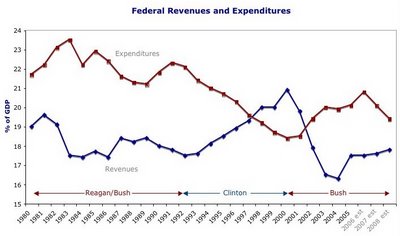Vote Democratic to End Voodoo Economics
In today's policy overview, we look at the question of whether we should be worried about recent federal budget deficits. Dick Cheney doesn't think so, and was quoted as saying so on page 297 of Ron Susskind's The Price of Loyalty:
 When prompted, Republicans offer three responses to this uncomfortable truth:
When prompted, Republicans offer three responses to this uncomfortable truth:
1. Circumstances beyond the federal government's control made the surplus look good under Clinton, and required that Bush return to deficit spending.
Look carefully at the slopes of the curves in the years 2001 to 2004: Revenues declined sharply, while expenditures climbed just as sharply. The federal deficits under George W. Bush didn't just happen; they were created by the policy decisions he put forward and the Republican-led Congress eagerly adopted.
2. That old chestnut: deficits pay for themselves.
Actually, they don't. But don't take my word on this, pay attention to this study released last winter by the Congressional Budget Office:
3. Deficits don't matter.
Words almost fail me. Fortunately they haven't failed Robert Rubin, whom I quoted on the subject last year:
Unless you somehow believe, despite the evidence, that deficits don't matter, you cannot avoid the fiscal failure of our federal government.
And for those accept the truth that deficits do matter, there is only one course of action that would restore responsibility to our national government; and that is to vote for the Democratic Party -- the only party that has shown itself capable of balancing our federal budget.
This is the second part in a series on the issues in this election. And for those anxious for me to get to the point and endorse particular candidates, please be patient. Next week, I will present my endorsements, building on this week's policy review.
"Reagan proved deficits don't matter."Given recent history, I can understand why Republicans would wish that it were so. The record budget surpluses created under Bill Clinton have yielded to record budget deficits under George W. Bush. This chart, taken from figures from the Office of Management and Budget, lays out the ugly truth:
 When prompted, Republicans offer three responses to this uncomfortable truth:
When prompted, Republicans offer three responses to this uncomfortable truth:1. Circumstances beyond the federal government's control made the surplus look good under Clinton, and required that Bush return to deficit spending.
Look carefully at the slopes of the curves in the years 2001 to 2004: Revenues declined sharply, while expenditures climbed just as sharply. The federal deficits under George W. Bush didn't just happen; they were created by the policy decisions he put forward and the Republican-led Congress eagerly adopted.
2. That old chestnut: deficits pay for themselves.
Actually, they don't. But don't take my word on this, pay attention to this study released last winter by the Congressional Budget Office:
Under various assumptions, the supply-side economic effects of the tax cut are estimated to offset between 1 percent and 22 percent of that revenue loss over the first five years.For those unschooled in economic analysis, that means that the tax cuts in question would result in a revenue drop of 78 to 99 percent.
3. Deficits don't matter.
Words almost fail me. Fortunately they haven't failed Robert Rubin, whom I quoted on the subject last year:
Virtually all mainstream economists agree that, over time, sustained deficits crowd out private investment, increase interest rates, and reduce productivity and economic growth. But, far more dangerously, if markets here and abroad begin to fear long-term fiscal disarray and our related trade imbalances, those markets could then demand sharply higher interest rates for providing long-term debt capital and could put abrupt and sharp downward pressure on the dollar.Ronald Reagan once said, "Facts are stubborn things." The facts of recent history speak volumes, and lead us to the inescapable conclusion: The party of fiscal responsibility -- the only party to have produced sustained budget surpluses in our lifetime -- is the Democratic Party.
Unless you somehow believe, despite the evidence, that deficits don't matter, you cannot avoid the fiscal failure of our federal government.
And for those accept the truth that deficits do matter, there is only one course of action that would restore responsibility to our national government; and that is to vote for the Democratic Party -- the only party that has shown itself capable of balancing our federal budget.
This is the second part in a series on the issues in this election. And for those anxious for me to get to the point and endorse particular candidates, please be patient. Next week, I will present my endorsements, building on this week's policy review.



0 Comments:
Post a Comment
<< Home